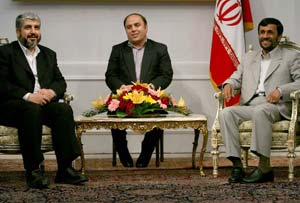
Iranian President Mahmoud Ahmadinejad (R) meets with
Hamas leader Khaled Meshaal (L) in Tehran, Iran April 16, 2006. Iran is donating
US$50 million in aid to the Hamas-led Palestinian government after the US and
the European Union froze financing. -Xinhua/AFP
Iran and Qatar have offered US$50 million apiece in aid to the Hamas-led
Palestinian Government after the United States and the European Union froze
financing.
Iran's foreign minister, Manouchehr Mottaki, announced the Iranian donation
on Sunday, the last day of a pro-Palestinian conference.
"We warn that if the aid is cut and if this continues in the near future,"
the Palestinians "will witness a humanitarian disaster and the occupiers and
their supporters will be responsible," Mr. Mottaki said, referring to Israel,
according to the ISNA news agency.
Qatar announced today through its state news agency that it would also extend
US$50 million to the Palestinian Authority. An official with the Foreign
Ministry said the money represented the full amount of a pledge Qatar made last
month at an Arab League summit.
The European Union suspended its US$600 million direct aid package to the
Palestinian Government, and the United States suspended most of a US$400 million
donation after Hamas's unexpected electoral victory in January. The measures
were aimed at increasing pressure on the group to renounce violence and to
recognize Israel.
The three-day conference brought together some 600 Palestinian militant
leaders and their supporters from Muslim countries.
The exiled Hamas political leader, Khaled Meshal, said Saturday at the
conference that his government would never recognize Israel.
He also said the government needed US$170 million a month, of which US$115
million would go toward paying salaries. But, Mr. Meshal said, the government
has inherited not only an empty treasury, but also US$1.7 billion in debts.
During his speech on Sunday, Mr. Mottaki dismissed a demand for Iran to
suspend its uranium enrichment program. Both the United Nations nuclear agency
and the Security Council have demanded that Iran freeze its program.
His comments appeared to be a response to Mohamed ElBaradei, the director
general of the United Nations nuclear agency, the International Atomic Energy
Agency, who visited Iran on Thursday to try to persuade the Iranian authorities
to freeze the nuclear program.
"We do not want anything more than our rights stated in the Nonproliferation
Treaty, and we cannot accept anything beyond the regulations of the treaty and
nuclear agency," Mr. Mottaki said.
Iran announced last week that it had enriched uranium to 3.5 percent, a level
of purity that, if enough could be produced, might fuel a nuclear reactor. If
enriched to higher levels, it could be used for making nuclear bombs.
Melissa Fleming, a spokeswoman for the nuclear agency who was in Tehran last
week, said a team of technical inspectors was expected to visit Iran's nuclear
facilities this week.



